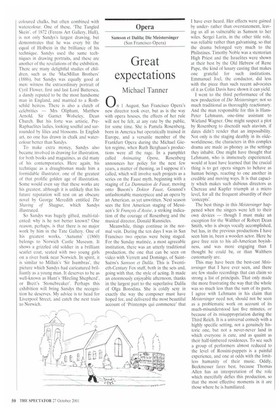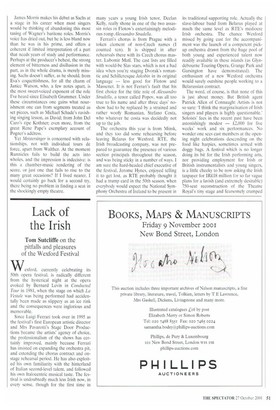Opera
Samson et Dalila; Die Meistersinger (San Francisco Opera)
Great expectations
Michael Tanner
On 1 August, San Francisco Opera's new director took over, but as is the way with opera houses, the effects of her rule will not be felt, at any rate by the public, for some time. She is Pamela Rosenberg, born in America but operatically trained in Europe, and a versatile member of the Frankfurt Opera during the Michael Gielen regime, when Ruth Berghaus's productions were all the rage. In a pamphlet called Animating Opera, Rosenberg announces her policy for the next few years, a matter of theming, as I suppose it's called, which will involve such projects as a series on the Faust myth, beginning with a staging of La Damnation de Faust, moving onto Busoni's Doktor Faust, Gounod's unfashionable masterpiece and an opera by an American, as yet unwritten. Next season sees the first American staging of Messiaen's Sr Francois d'Assise, a striking indication of the courage of Rosenberg and the musical director, Donald Rurmicles.
Meanwhile, things continue in the normal vein. During the ten days I was in San Francisco two operas were being staged. For the Sunday matinee, a most agreeable institution, there was an utterly traditional production, the one that can be seen on video with Verrett and Domingo, of SaintSaens's Samson et Dalila. This is Twentieth-Century Fox stuff, both in the sets and, going with that, the style of acting. It made an enormously enjoyable afternoon, thanks in the largest part to the superlative Dalila of Olga Borodina. She is coldly sexy in exactly the way the composer must have hoped for, and delivered the most beautiful account of `Printemps qui commence' that
I have ever heard. Her effects were gained by underrather than overstatement, leaving us all as vulnerable as Samson to her wiles. Sergei Larin, in the other title role, was reliable rather than galvanising, so that the drama belonged very much to the Philistines. Timothy Noble was a stentorian High Priest and the Israelites were shown at their best by the Old Hebrew of Rene Pape, the kind of luxury casting that makes one grateful for such institutions, Emmanuel Joel, the conductor, did less with the piece than such recent advocates of it as Colin Davis have shown it can yield.
I went to the third performance of the new production of Die Meistersinger; not so much traditional as thoroughly reactionary. And the man responsible for this is HansPeter Lehmann, one-time assistant to Wieland Wagner. One might suspect a plot by Rosenberg to discredit such atavism, if dates didn't render that an impossibility. Not only is the staging deathly in its oldeworldinesse, the characters in this complex drama are made as phoney as the settings they inhabit. One might have thought that Lehmann, who is immensely experienced, would at least have learned that the crucial thing is to get opera singers to behave as human beings, reacting to one another in credible and moving ways. It is that capacity which makes such dubious directors as Chereau and Kupfer triumph at a micro level, for all the frequent absurdity of their 'concepts'.
The best things in this Meistersinger happened when the singers were left to their own devices — though I must make an exception for the Walther of Robert Dean Smith, who is always vocally accomplished, but has, in the previous productions I have seen him in, been a wooden actor. Here he gave free rein to his all-American boyishness, and was more engaging than I thought he could be, or than Walthers customarily are.
This may have been the best-cast Meistersinger that I have ever seen, and there are few studio recordings that can claim so strong a list of principals. That only made the more frustrating the way that the whole was so much less than the sum of its parts. I agree with Lehmann in his claim that Meistersinger need not, should not be seen as a problematic work on account of its much-misunderstood last five minutes, or because of its misappropriation during the Third Reich. It is a universal comedy with a highly specific setting, not a genuinely historic one, but not a never-never land in which everyone is cute, and as quaint as their half-timbered residences. To see such a group of performers almost reduced to the level of Rossini-puppets is a painful experience, and one at odds with the limitless humanity of their music. Oddly, Beckmesser fares best, because Thomas Allen has an interpretation of the role which mercifully defies this production, so that the most effective moments in it are those where he is humiliated.
James Morris makes his debut as Sachs at a stage in his career when most singers would be thinking of abandoning this most taxing of Wagner's baritone roles. Morris's voice has dried out, but he is less bland now than he was in his prime, and offers a coherent if limited interpretation of a part that needs years of study and performance. Perhaps at the producer's behest, the strong element of bitterness and disillusion in the part, as in the whole drama, is merely missing. Sachs doesn't suffer, as he should, from Eva's coquettishness, for all the charm of Janice Watson, who, a few notes apart, is the most sweet-voiced exponent of the role I've heard since Elisabeth Grummer. Under these circumstances one gains what nourishment one can from segments treated as set pieces, such as Michael Schade's ravishing singing lesson, as David; from John Del Caro's ripe Kothner; even more, from the great Rene Pape's exemplary account of Pogner's address.
Yet Meistersinger is concerned with relationships, not with individual tours de force, apart from Walther. At the moment Runnicles fails to build the acts into wholes, and the impression is indecisive: is this a chamber-music rendering of the score, or just one that fails to rise to the many great occasions? If I lived nearer, I would certainly go back for a second try, there being no problem in finding a seat in the shockingly empty theatre. many years a young Irish tenor, DecIan Kelly, really shone in one of the two assassin roles in Flotow's entertainingly melodious romp Alessandro Stradella.
Ferrari's chorus is from Prague with a token element of non-Czech names (I counted ten). It is shipped in after rehearsals there with its Czech chorus master, Lubomir Matl. The cast lists are filled with would-be Slav stars, which is not a bad idea when you're staging Dvorak's romantic and Schilleresque Jakobin in its original language — less good for Flotow and Massenet. It is not Ferrari's fault that his first choice for the title role of Alessandro Strode/la, a tenor called Popov, was all too true to his name and after three days' noshow had to be replaced by a strained and rather woofy Romanian, Stefano Costa, who whatever he costa was decidedly not up to the job.
The orchestra this year is from Minsk, and they too did some rehearsing before leaving Belarus for Wexford. RTE. the Irish broadcasting company, was not prepared to guarantee the presence of various section principals throughout the season, and was being sticky in a number of ways. I am sure the hard-headed chief executive of the festival, Jerome Hynes, enjoyed telling it to get lost. as RTE probably thought it had a trump card in the 50th season, when everybody would expect the National Symphony Orchestra of Ireland to be present in its traditional supporting role. Actually the slave-labour band from Belarus played at much the same level as RTE's mediocre Irish orchestra, The chance Wexford missed by going east for the accompaniment was the launch of a competent pickup orchestra drawn from the huge pool of both young and experienced talent now readily available in these islands (as Glyndebourne Touring Opera, Grange Park and Garsington have demonstrated). The enthusiasm of a new Wexford orchestra would surely outshine people working to a Belarussian contract.
The word, of course, is that none of this is just about money. But British agent Patrick Allen of Connaught Artists is not so sure: 'I think the marginalisation of Irish singers and players is highly questionable.' Soloists' fees in the recent past have been astonishingly modest — £2,000 for five weeks' work and six performances. No wonder one sees cast members at the opening night celebrations descending on the food like harpies, sometimes armed with doggy bags. A festival which is no longer doing its bit for the Irish performing arts, nor providing employment for Irish or British instrumentalists and young singers, is a little cheeky to be now asking the Irish taxpayer for IR£18 million for so far vague plans for a lavish (and extremely desirable) 750-seat reconstruction of the Theatre Royal's tiny stage and fearsomely cramped











































































 Previous page
Previous page